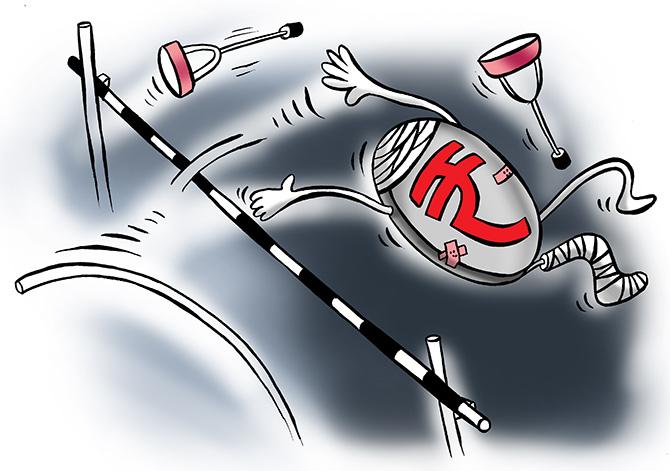 | « Back to article | Print this article |
RBI is expecting the rupee to stay close to Rs 75 to a dollar, as COVID-19 forces foreign funds to withdraw from emerging markets.

With the rupee falling 10 per cent against the US dollar since January, India Inc is staring at an extra repayment burden on its overseas loans.
The overseas fundraising fell to $5 billion in the first quarter of calendar year 2020, compared to $8.8 billion raised by Indian companies in the same period of 2019.
This, even as corporates take steps to cut risks due to the coronavirus disease (COVID-19) pandemic.
On Monday, the Indian currency was trading at Rs 76.27 to a dollar.
The Reserve Bank of India (RBI) is expecting the rupee to stay close to Rs 75 to a dollar, as COVID-19 forces foreign funds to withdraw from emerging markets.
Analysts expect the rupee to remain under pressure till the pandemic subsides and the RBI takes measures to keep the financial markets liquid and stable.
Analysts said while companies - with forward cover - will find it easier to repay their overseas debt, half the Indian companies with open positions are in financial dire straits.
According to data from Bloomberg, about $2.1 billion worth of dollar bonds are maturing till June.
“It depends on the risk management strategy of every corporate. Several top companies have taken cover.
"But it’s the medium- and small-sized companies which may face problems due to lack of cover,” said a Mumbai-based analyst.
Large corporates like Reliance, Tata, Ashok Leyland, and the Mahindras have taken adequate cover, he added.
“There are several Indian firms exposed to overseas debt. In such an unprecedented scenario, no level is holding true for the Indian rupee,” said Rahul Gupta, head of research-currency, Emkay Global Financial Services.
“Globally, market sentiments are fragile over the corporate impact of the pandemic.
"Since the beginning of this year, the rupee has already depreciated by nearly 7 per cent to 76.54.
"Any further depreciation will hurt the companies further. They will end up coughing up more money.
"In such a pessimistic market, it will not be a surprise if the rupee depreciates to 77.5 and beyond in the coming weeks,” added Gupta.
Chief financial officers said during the lockdown period, the cash flows of several Indian companies have dried up, making it difficult for them to repay loans.
“There will be defaults as companies are not making any sales. There could be more asset sales to repay foreign loans,” he said.
While companies, which have foreign exchange earnings, will be able to tide over the crisis as they have a natural hedge against a weakening rupee, others may not be so lucky - especially in the real estate and non-banking financial company sectors.
Another option for companies is to refinance their foreign loans.
For instance, Macrotech Developers (earlier known as Lodha Developers) refinanced in the March quarter.
The moratorium announced by the RBI on loan repayments to local banks, and a steep rate cut will help companies divert funds to repay foreign loans.